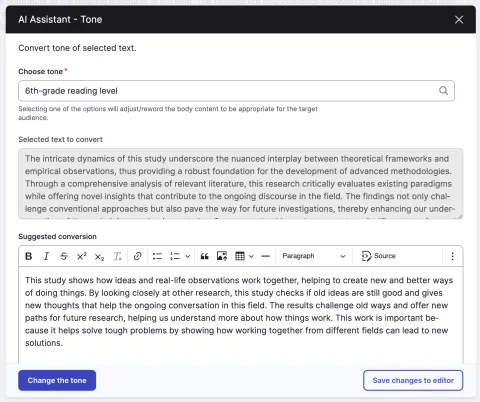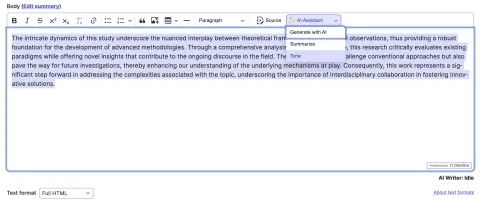Overview
Urban Insight, as the maintainer of DLAW (Drupal for Legal Aid Websites), a free, open-source Drupal distribution created with Legal Services Corporation support, is leading efforts to apply AI-powered editing tools to legal aid websites. Our goal is to help legal aid organizations simplify their public-facing content and make legal information easier to understand.
Challenge
According to the U.S. Department of Education, 54% of adults in the U.S. read below a 6th-grade level. Legal aid websites often contain complex legal terminology that can be hard to grasp, especially in high-stress situations.
We aimed to build a solution that could:
- Measure the reading level and complexity of content.
- Offer simplified wording aligned with a 6th-grade level.
- Maintain legal accuracy and original intent.
- Empower editors to review, approve, adjust, or reject AI suggestions.
Solution: AI-Powered Content Simplification
We introduced an AI-powered content tool right into Drupal’s WYSIWYG editor (CKEditor). Editors can now:
- Use the AI-Powered tool to draft initial content.
- Have content re-written to align with a "6th-grade reading level".
- Review AI-generated simplification suggestions.
- Accept, tweak, or discard those suggestions.
This keeps legal content accurate while enhancing clarity and comprehension for website visitors.


Key Features
- AI‑Powered Text Simplification: Tailored to reduce complexity, targeting a 6th‑grade level for improved clarity.
- Integrated Editorial Workflow: Fully embedded in DLAW’s editor to minimize disruption.
- Editor Control: Human‑in‑the‑loop—no automatic publishing without human review.
- Transparent Process: Suggested edits are visible in‑context and only applied when approved.
Technical Configuration
AI Backend
- Set up an OpenAI organization and project (Urban Insight → DLAW) with secure API credentials.
- Integrated OpenAI via Drupal’s AI Assistant module, trained for text simplification tasks.
Drupal Integration
- Upgraded DLAW to Drupal 10.3+ to support AI CKEditor features.
- Installed modules:
- AI Core (manages providers/models)
- AI API Explorer (tests prompts/models)
- AI CKEditor Integration
- Key (secures sensitive credentials)
- Created and configured the AI provider to enable the AI Assistant dropdown.
Editor Workflow
- Highlight text → select tone → see simplified output → review before applying.
Example: Before and After
Original:
As tenant, you are obligated to pay your landlord monthly rent. This obligation to pay rent is separate and distinct from your landlord’s obligation to provide a livable property. In other words, if you withhold rent because your residence has serious maintenance or utility problems, your landlord can still try to evict you for nonpayment of rent.
AI‑Simplified:
As a renter, you must pay your landlord rent every month. This rule is separate from your landlord’s job to keep the home safe and livable. This means that even if your home has big problems, like broken utilities or serious repairs that aren’t fixed, your landlord can still try to evict you if you stop paying rent.
Impact
This implementation enables legal aid organizations using DLAW (and OpenAdvocate) to:
Improve clarity and readability of legal content.
- Reduce editing time and labor.
- Serve a wider audience with diverse literacy backgrounds.
- Preserve legal precision while empowering human editors.
By integrating AI thoughtfully, DLAW enhances comprehension—while keeping content governance securely in human hands.
Key Benefits
- Ensures clarity and comprehension.
- Maintains legal accuracy.
- Fully compatible with DLAW’s editorial and publishing workflows.
See It In Action
Next Steps
- Get Involved: Want AI features for your Drupal site? Contact us.
- Conference‑ready title: AI‑Powered Content Simplification for Legal Aid Websites


